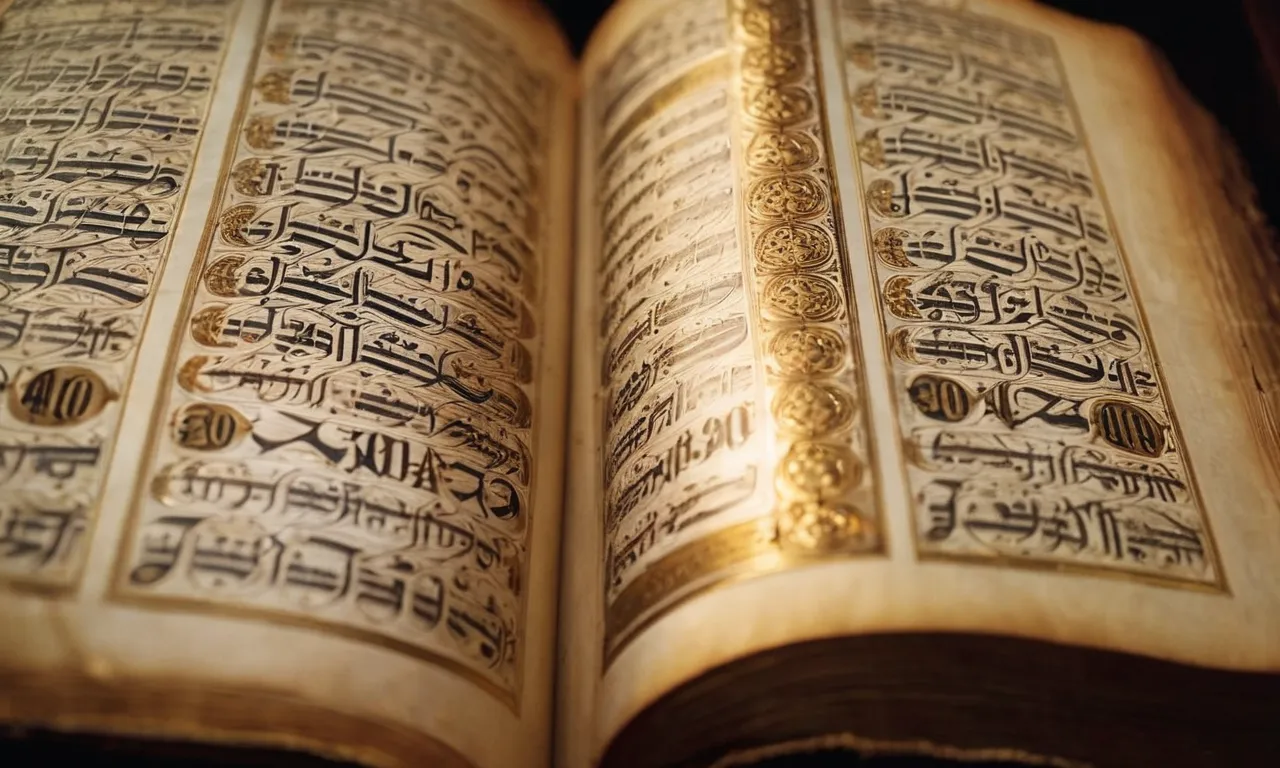When Was Abraham Born According To The Bible?
The story of Abraham is central to Judaism, Christianity, and Islam. As the patriarch of monotheism, Abraham’s life story provides key details about God’s covenant and interactions with humankind. If you’re wondering exactly when Abraham was born based on scripture, here’s a quick answer: according to an analysis of biblical chronology, Abraham was likely born around 2166 BCE.
In this comprehensive article, we will analyze relevant biblical passages to trace key events and figures leading up to Abraham’s birth. By establishing the genealogical timelines before and after Abraham, we can approximate his date of birth within a reasonable range.
Genealogy Before Abraham
The Lineage from Adam to Noah
The book of Genesis provides a genealogy tracing the lineage from Adam to Noah. According to Genesis 5, Adam fathered Seth at age 130. Seth then fathered Enosh at 105. This lineage continued for ten generations, with each patriarch living over 900 years and having sons late in life:
- Adam -> Seth -> Enosh -> Kenan -> Mahalalel -> Jared -> Enoch -> Methuselah -> Lamech -> Noah
Methuselah holds the record for longest lived at 969 years. The ages and lifespans point to great vitality in this era. Genesis 5:32 summarizes: “After Noah was 500 years old, he became the father of Shem, Ham and Japheth.”
Though the Bible does not provide Noah’s specific age at the great flood, it is reasonable to deduce he was over 500 years old.
Noah to Abram (Abraham)
After the dramatic event of the flood, the Earth was repopulated through Noah’s three sons. According to Genesis 11, Shem’s lineage leads to Abram ten generations later:
- Shem -> Arphaxad -> Shelah -> Eber -> Peleg -> Reu -> Serug -> Nahor -> Terah -> Abram/Abraham
Whereas prereflood patriarchs lived over 900 years, lifespans rapidly declined postflood. Though the time duration from Noah to Abraham is not specified, it spans multiple centuries. The genealogy transitions from mythic stories to recognizable history interweaving the rise of civilization.
| Ancestor | Age at Son’s Birth | Total Years Lived |
|---|---|---|
| Noah | 500+ years | 950 years |
| Shem | 100 years | 600 years |
| Eber | 34 years | 464 years |
| Serug | 30 years | 230 years |
| Terah (Abraham’s father) | 70 years | 205 years |
As seen in the data, early descendants of Shem lived nearly as long as Noah. But lifespan duration declined with each generation. Abraham’s grandfather Terah only lived to 205. We are not told Terah’s age when Abraham was born.
But piecing together timelines suggests Terah was likely between 120-140 years old. Shortly after Abraham’s birth the family set out on a long journey from Ur to Canaan, eventually settling in Haran (modern Turkey). The rest is biblical history!
The Call of Abram (Genesis 12)
God’s call to Abram to leave his country and go to the land that God would show him marked a pivotal moment in biblical history. Abram, who would later be renamed Abraham by God, obeyed God’s call and left his home country of Haran to travel to Canaan.
This act of faith and obedience by Abraham sets the stage for the rest of the biblical narrative. God promises to make Abraham into a great nation, to bless those who bless him and to curse those who curse him, and that all peoples on earth would be blessed through him (Genesis 12:1-3).
These promises point ahead to the formation of the people of Israel from Abraham’s descendants, as well as the ultimate blessing that would come to all peoples through one of those descendants – Jesus Christ.
Key Details
- God calls Abram (later renamed Abraham) to leave behind his country, his people, and his father’s household and go to the land that God would show him (Genesis 12:1)
- God promises to Abram that he will become a great nation, be blessed and become a blessing, have his name be made great, and that all peoples on earth will be blessed through him (Genesis 12:2-3)
- Abram obeys and departs from Haran with his wife Sarai (later renamed Sarah) and his nephew Lot, traveling to Canaan (Genesis 12:4-5)
- Abram passes through Canaan to Shechem and the oak of Moreh, where God appears again to Abram and promises the land to his offspring (Genesis 12:6-7)
- Abram builds altars to God in Shechem and then goes on to Bethel and Ai in Canaan, continuing to call on God’s name (Genesis 12:8)
This event marks the beginning of God’s plan to create and bless the nation of Israel, through whom Jesus the Messiah would one day be born to bring salvation to the entire world. Abraham’s obedient faith serves as an example for all believers who seek to follow God’s leading and participate in His redemptive plan.
The Birth of Isaac (Genesis 21)
The birth of Isaac is one of the most monumental events in the Bible, as it marks the fulfillment of God’s promise to Abraham and Sarah that they would have a son in their old age. Isaac’s birth is recorded in Genesis 21.
By this point in the biblical narrative, Abraham was 100 years old and Sarah was 90 years old (Genesis 17:17). For many years they had been unable to conceive a child together. But God had previously told Abraham that he would become the father of many nations through a son born to Sarah (Genesis 17:16).
Though Abraham and Sarah had waited patiently for this promise to be fulfilled, their faith wavered at times. Sarah gave her servant Hagar to Abraham as a second wife, hoping to obtain a child through her. Hagar bore Abraham a son named Ishmael (Genesis 16).
But this was not the son God had promised would come through Sarah.
When three visitors (the Lord and two angels) showed up at Abraham’s tent, they prophesied that within a year’s time Sarah would bear Abraham a son. Sarah laughed to herself when she overheard this, thinking she was past childbearing age.
But the Lord gently rebuked her for her disbelief, asking “Is anything too hard for the Lord?” (Genesis 18:9-15).
A year later, when Abraham was 100 and Sarah was 90, the Lord fulfilled His promise. “The Lord visited Sarah as he had said, and the Lord did to Sarah as he had promised. And Sarah conceived and bore Abraham a son in his old age at the time of which God had spoken to him” (Genesis 21:1-2).
Abraham named his son Isaac, which means “he laughs.” Sarah declared, “God has made laughter for me; everyone who hears will laugh over me.” She was filled with joy that the Lord enabled her to conceive in her old age (Genesis 21:3-6).
Isaac’s birth was a pivotal moment in God’s covenant with Abraham. Through this child of promise, Abraham would become the father of God’s chosen people, Israel. The Messiah himself would one day be numbered among the descendants of Abraham and Isaac.
No longer would Ishmael be considered Abraham’s heir – Isaac would be the true heir through whom God’s promises would be realized (Genesis 21:8-13).
The birth of Isaac illustrates several important biblical themes:
- God is faithful. He kept His promise to give Abraham and Sarah a son, even when it seemed impossible.
- God accomplishes the impossible. A child born to a 90-year-old woman highlights God’s supernatural power.
- God’s plans prevail. Ishmael was not the child of promise, though Abraham tried to help God’s plan along. Isaac was the true heir God had chosen.
The birth of Isaac marked an exciting new chapter in God’s relationship with Abraham. Through this long-awaited son, God’s covenant promises could move forward toward fulfillment.
Extra-Biblical Sources About Abraham’s Age
The Book of Jubilees
The Book of Jubilees, an early Jewish work from the 2nd century BC, provides additional information about Abraham’s age. According to Jubilees, Abraham was born in the year 1876 AM (AM referring to “Anno Mundi” or the year from the creation of the world).
Jubilees says that Abraham lived to the age of 175 years old (Jubilees 23:1), which would mean he was born in 1876 BC and died in 1701 BC.
This fits with the biblical narrative which records Abraham dying at the age of 175 (Genesis 25:7). So if Abraham was 175 years old at his death in 1701 BC according to Jubilees, his estimated year of birth would be 1876 BC at the impressive age of 175 years old!
Josephus’ Antiquities of the Jews
The Jewish historian Josephus (c. 37-100 AD), in his work Antiquities of the Jews, also gives information about Abraham’s age. Josephus writes:
“I will now treat of the Hebrews. The son of Phaleg, whose father Was Serug, was Ragau; whose son was Saruch; his son was Nachor; his son was Terah, who was the father of Abraham…Now Abraham lived with his father in the land of the Chaldeans…for Terah begat Abram in his seventieth year” (Antiquities 1.6.5).
So according to Josephus, Abraham was born when his father Terah was 70 years old. Josephus says nothing definitive about Abraham’s age at death. But taking Terah’s age of 70 at Abraham’s birth, and assuming Terah died at 205 years old (based on Genesis 11:32), Abraham would have been about 135 years old when Terah died.
While Jubilees and Josephus differ from the biblical text about Terah’s age when Abraham was born, they still provide helpful extra-biblical information confirming Abraham’s extremely old age of over 170 years old, an amazing testament to his longevity and place in history!
Scholarly Analysis and Estimates
Determining the exact year of Abraham’s birth is challenging, as the Bible does not provide an explicit date. However, scholars have used biblical chronologies, archeological evidence, and records from ancient civilizations to analyze and estimate a likely timeframe.
Clues from the Biblical Timeline
The Bible provides some helpful time markers to bracket Abraham’s lifetime, though various interpretations exist:
- Abraham was 75 when he left Haran for Canaan (Genesis 12:4). This was after his father Terah’s death at 205 (Genesis 11:32).
- The Israelites sojourned in Egypt for 430 years (Exodus 12:40). This period began when Jacob entered Egypt at 130 years old (Genesis 47:9).
- Exodus from Egypt is estimated around 1440 BC.
Adding these durations leads to Abraham’s birth around 2165 BC. However, some scholars interpret the Exodus as around 1290 BC, which would place Abraham’s birth closer to 1920 BC.
Archaeological Evidence
Archaeological findings provide insight into the civilizations and cultures that existed in Abraham’s time:
- The Middle Bronze Age in the Levant region is dated approximately 1950 – 1550 BC. Abraham likely lived during the MB I or MB II periods.
- Major urban centers like Hazor, Megiddo, and Jericho were established in Canaan by 2000 BC.
- Cuneiform tablets from Mari mention places and customs that align with the Abrahamic accounts.
These findings point to Abraham living sometime between 2000 – 1700 BC. A mid-range estimate would be around 1900 BC.
Ancient Near East Records
Some researchers cross-reference Biblical chronology with historical records:
- Sodom and Gomorrah were likely destroyed during the Early Bronze IV period, around 2100 – 1900 BC.
- Hammurabi, king of the First Babylonian Dynasty, reigned 1792 – 1750 BC. He is a contemporary of Abraham in the Bible.
- Assyrian King List records the beginning of the Assyrian Empire around 1850 BC, when Abraham was alive.
Correlating Biblical and archaeological timelines places Abraham’s birth between 2100 – 1800 BC, with many scholars favoring around 2000 – 1900 BC.
While the exact year remains unknown, scholarly research allows reasonable estimates for Abraham’s lifetime based on available evidence. Most analysts suggest he lived sometime during the Middle Bronze Age between 2100 – 1700 BC.
Conclusion
By analyzing key biblical passages, events, ages, and chronologies related to Abraham, we can estimate he was born around the 22nd century BCE. Of course there is a range of scholarly debate about exact years.
But with reasonable timelines before and after Abraham anchored by scriptural evidence, we can approximate Abraham’s birth to the early second millennium B.C.
Understanding when Abraham lived helps us contextualize the emergence of monotheism and God’s revelations to this patriarch. Whether you’re studying theology or ancient Near East history, unpacking the chronology around Abraham’s life based on scripture provides invaluable perspective.








